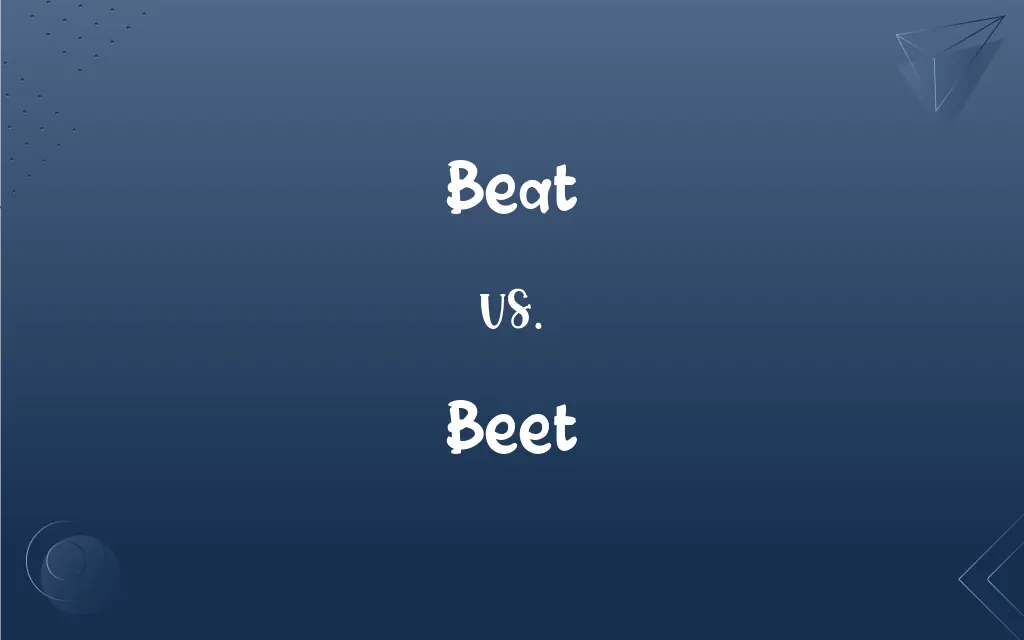Beat vs. Beet: What's the Difference?
Edited by Janet White || By Harlon Moss || Updated on November 16, 2023
Beat refers to striking repeatedly or making a rhythmic sound, whereas beet is a root vegetable, often red or purple, known for its edible roots and leaves.

Key Differences
Beat encompasses a range of meanings, from striking repeatedly to producing a rhythmic sound, as in music or the heart's pulsation. Beet, in contrast, refers specifically to a type of plant in the Amaranthaceae family, known for its edible roots. While beat signifies action or rhythm, beet is entirely associated with agriculture and cuisine.
The term beat can imply winning or surpassing someone in a competition, as well as patrolling a specific route regularly. Beet, on the other hand, is often associated with healthy eating and is used in various culinary dishes, from salads to soups. Beat represents action or performance, whereas beet is fixed in the context of food and nutrition.
In music, beat is a fundamental concept, referring to the basic unit of time in a piece. Beet, however, might appear in culinary discussions, especially those focusing on vegetarian or plant-based diets. This contrast highlights beat's role in the arts versus beet's role in dietary habits.
Beat also has colloquial uses, such as feeling exhausted or worn out ("I'm beat"), while beet lacks such idiomatic expressions. The versatility of beat in language sharply contrasts with the singular, specific reference of beet to the vegetable.
In a technical sense, beat can refer to the process of mixing ingredients vigorously in cooking, creating a link, albeit slight, to the culinary world of beet. Yet, beet's culinary applications are far more direct, being a staple in many dishes and known for its nutritional value.
ADVERTISEMENT
Comparison Chart
Definition
Striking, rhythmic sound, or surpassing
A type of root vegetable
Context of Use
Music, competition, exhaustion
Cooking, agriculture
Idiomatic Expressions
Has various idiomatic uses ("I'm beat")
Lacks idiomatic expressions
Relation to Culinary
Used metaphorically in cooking (mixing)
Directly related as an edible vegetable
Cultural Connotations
Varied, includes arts and sports
Primarily associated with food and health
ADVERTISEMENT
Beat and Beet Definitions
Beat
Rhythmic musical sound.
The beat of the song was catchy.
Beet
Root vegetable.
She harvested beets from her garden.
Beat
Regular patrol route.
The police officer walked his beat.
Beet
Used in salads.
He added sliced beet to the salad.
Beat
Striking repeatedly.
He beat the drum loudly.
Beet
Colorful food.
The beet's deep red color is natural and vibrant.
Beat
Feeling exhausted.
After the long day, I'm completely beat.
Beet
Rich in nutrients.
Beets are high in vitamins and minerals.
Beat
Surpass in competition.
She beat her opponent in the race.
Beet
Ingredient in soups.
Beet soup is warming in winter.
Beat
To strike repeatedly.
Beet
A biennial Eurasian plant (Beta vulgaris) grown as a crop plant for its edible roots and leaves.
Beat
To subject to repeated beatings or physical abuse; batter.
Beet
The swollen root of this plant eaten as a vegetable, typically having reddish flesh.
Beat
To punish by hitting or whipping; flog.
Beet
The sugar beet.
Beet
Beta vulgaris, a plant with a swollen root which is eaten or used to make sugar.
The beet is a hardy species.
There are beets growing over these.
Beet
A beetroot, a swollen root of such a plant.
Beet
To improve; to mend.
Beet
To kindle a fire.
Beet
To rouse.
Beet
A biennial plant of the genus Beta, which produces an edible root the first year and seed the second year.
Beet
The root of plants of the genus Beta, different species and varieties of which are used for the table, for feeding stock, or in making sugar.
Beet
Biennial Eurasian plant usually having a swollen edible root; widely cultivated as a food crop
Beet
Round red root vegetable
FAQs
What is the primary meaning of "beat"?
To defeat someone in a competition or to rhythmically strike something.
Can "beat" refer to a police patrol route?
Yes, a "beat" can refer to a regular path or area that a police officer patrols.
What is "beat" in journalism?
In journalism, a "beat" refers to a specific subject area a reporter covers regularly.
Is "beat" used in cooking?
Yes, "beat" is used to describe vigorously stirring ingredients, usually to incorporate air.
Can "beat" mean to surpass or do better than?
Yes, "beat" can mean to do better than or to surpass in performance.
What does "beat" mean in music?
In music, a "beat" is the basic unit of time or a pulse.
What is a "beet"?
A "beet" is a root vegetable known for its deep red color and sweet taste.
Does "beat" have a colloquial meaning?
Yes, colloquially "beat" can mean very tired or exhausted.
Are there different types of beets?
Yes, there are several types, including red, golden, and sugar beets.
What part of speech is "beat" commonly used as?
"Beat" is commonly used as a verb, but it can also be a noun.
Is "beat" used in sports?
Yes, "beat" in sports means to defeat another team or player.
Can "beat" be a noun?
Yes, "beat" can be a noun, referring to a rhythmic movement or a regular route.
Can "beet" refer to anything besides the vegetable?
Typically, "beet" refers only to the vegetable and its varieties.
Is "beet" ever a verb or adjective?
No, "beet" is primarily used as a noun.
How are beets typically prepared?
Beets can be roasted, boiled, pickled, or eaten raw in salads.
Do beets have any cultural significance?
In some cultures, beets are used in traditional dishes and have symbolic meanings.
What are beets commonly used for?
Beets are used in cooking for their flavor, color, and nutritional value.
Are beets associated with any health benefits?
Yes, beets are known for their high nutrient content and potential health benefits.
Can "beet" be pluralized?
Yes, the plural form is "beets."
Is "beet" used in any expressions?
Not commonly, though "beet-red" can describe a deep red color.
About Author
Written by
Harlon MossHarlon is a seasoned quality moderator and accomplished content writer for Difference Wiki. An alumnus of the prestigious University of California, he earned his degree in Computer Science. Leveraging his academic background, Harlon brings a meticulous and informed perspective to his work, ensuring content accuracy and excellence.
Edited by
Janet WhiteJanet White has been an esteemed writer and blogger for Difference Wiki. Holding a Master's degree in Science and Medical Journalism from the prestigious Boston University, she has consistently demonstrated her expertise and passion for her field. When she's not immersed in her work, Janet relishes her time exercising, delving into a good book, and cherishing moments with friends and family.































































